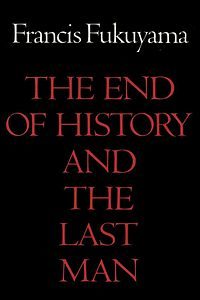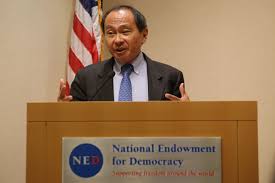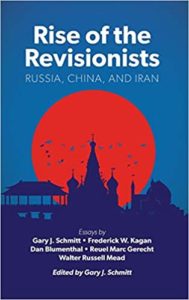 The resurgence of threats to liberal democracy — external and internal — does not refute the principal thesis of Francis Fukuyama’s “The End of History?” says a prominent analyst. The key claim was not that history guaranteed liberal democracy’s worldwide triumph but rather that concrete political developments had made manifest liberal democracy’s superior reasonableness and justness in comparison to all conceivable rivals, argues Peter Berkowitz, the Tad and Dianne Taube senior fellow at Stanford University’s Hoover Institution.
The resurgence of threats to liberal democracy — external and internal — does not refute the principal thesis of Francis Fukuyama’s “The End of History?” says a prominent analyst. The key claim was not that history guaranteed liberal democracy’s worldwide triumph but rather that concrete political developments had made manifest liberal democracy’s superior reasonableness and justness in comparison to all conceivable rivals, argues Peter Berkowitz, the Tad and Dianne Taube senior fellow at Stanford University’s Hoover Institution.
“The magnitude of the threats that have arisen over the last 30 years, however, does suggest that Fukuyama [a NED board member, below] overlooked the resilience of authoritarian political alternatives,” he suggests. “And that he underestimated the internal tensions and destabilizing passions inhering in liberal democracy — among them, on the one hand, the impatience with formal equality under the law that issues in a desire for an all-encompassing equality and, on the other, the quest for community and the longing for the sacred,”
 China, Iran, and Russia all assert a civilizational challenge to the Western liberal democratic order. It is difficult to know how deeply the three countries’ general populations hold their leaders’ views, but for the leadership in each, ideology is certainly an important source of legitimacy for their non-liberal rule at home, according to a new analysis.
China, Iran, and Russia all assert a civilizational challenge to the Western liberal democratic order. It is difficult to know how deeply the three countries’ general populations hold their leaders’ views, but for the leadership in each, ideology is certainly an important source of legitimacy for their non-liberal rule at home, according to a new analysis.
All three regimes are political models that, at their core, challenge the idea of liberal democracy, notes the introduction to Rise of the Revisionists: Russia China and Iran, by Gary J. Schmitt (ed.).
 Each in its own way sees itself in civilizational opposition to the liberal West, of which the United States is the most prominent exemplar. So the competition cannot be reduced to material and arms. The spirited rejection of liberalism—a seemingly inevitable and repeating byproduct of liberalism’s success—needs to be met with a renewed attachment to liberal democracy and the liberal order it fosters, the book’s authors contend:
Each in its own way sees itself in civilizational opposition to the liberal West, of which the United States is the most prominent exemplar. So the competition cannot be reduced to material and arms. The spirited rejection of liberalism—a seemingly inevitable and repeating byproduct of liberalism’s success—needs to be met with a renewed attachment to liberal democracy and the liberal order it fosters, the book’s authors contend:
Realists see the competition between the West and Russia, China, and Iran as the inevitable result of tensions between rising powers and the status-quo power of the United States. But a truer realism would recognize that the competition is shaped as much by the underlying character of the regimes as by any other factor and that coming to terms with this reality is key to the United States developing sound and effective counter-strategies.







